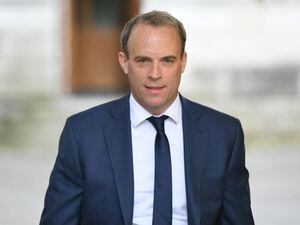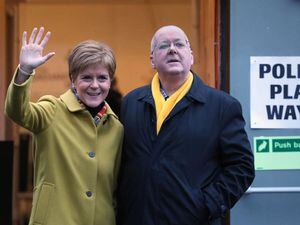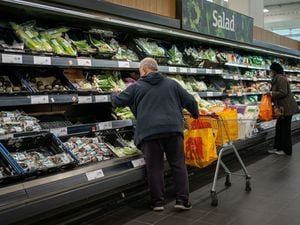Dominic Raab calls for probe into ‘deplorable’ poisoning of Alexei Navalny
The Foreign Secretary held talks with German foreign minister Heiko Maas and the pair agreed that Russia must explain what happened.

Foreign Secretary Dominic Raab has called on overseas allies to work together to support an investigation into the “utterly deplorable” alleged Novichok poisoning of Kremlin critic Alexei Navalny.
Mr Raab held talks on Thursday with German foreign minister Heiko Maas, during which the pair agreed the need for Russia to explain what happened.
It came after Downing Street warned there would be “severe consequences” for the people behind the attack – and did not rule out sanctions or fresh expulsions of diplomats.
Mr Raab said the poisoning of Mr Navalny was “utterly deplorable and a violation of international law” and said he and Mr Maas agreed to “support an investigation into this attack”.
Both men agreed that any use of Novichok “was a violation of the chemical weapons convention and therefore a matter of international concern”, the Foreign Office said.
Boris Johnson has described the suspected deployment of the same chemical weapon used in the 2018 Salisbury poisonings as “outrageous” and vowed to ensure “justice is done”.
The Prime Minister’s official spokesman, pressed on whether sanctions could be imposed on Russia or diplomats expelled, did not explicitly blame Moscow and said he would not “pre-empt what might happen next”.
Mr Johnson and his Foreign Secretary also met US President Donald Trump’s senior adviser, Jared Kushner, and, although the conversation was centred on the Middle East, it was likely Mr Navalny was discussed.
The opposition politician and corruption investigator fell ill on a flight back to Moscow from Siberia on August 20 before being transferred to Berlin. The 44-year-old remains on a ventilator in intensive care.
On Wednesday, German Chancellor Angela Merkel said Mr Navalny was the victim of “attempted murder by poisoning” with Novichok and added that the aim was to “silence” the opponent of Russian President Vladimir Putin.

In response, Mr Johnson, as foreign secretary, helped corral a wave of expulsions of Russian diplomats across the EU and US after Britain told 23 envoys to leave.
Mr Skripal and his daughter Yulia were two of five people exposed to the substance in Wiltshire, both spending weeks in hospital recovering.
But Dawn Sturgess, 44, of Amesbury, Wiltshire, died in July that year after coming into contact with a perfume bottle thought to originally contain the poison, while her partner, Charlie Rowley, spent nearly three weeks in hospital.
Wiltshire Police Detective Sergeant Nick Bailey was also exposed to the substance while responding to the attack, and almost died.
Sharing Mr Johnson’s tweet calling for justice, the officer said: “I have so much that I want to say about this tweet. But I can’t, and I won’t.”
DS Bailey later tweeted: “I think I need to clarify some things; I don’t hold any information relating to National Security, the UK Government, Russia, or the investigation into the 2018 or recent nerve agent attack.
“IF I did I wouldn’t say it because I’m a Police Officer. My views are based on being a victim and are entirely my own.
“In hindsight I wish I hadn’t written such an ambiguous tweet. Emotion got the better of me last night and I wanted to say something, without saying anything.”





